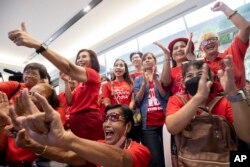Srettha Thavisin is Thailand’s new prime minister after winning a parliamentary vote Tuesday.
He is the wealthy leader of one of Thailand’s best-known property companies. He was elected prime minister just nine months after joining Pheu Thai, a political party known for supporting the poor.
Parliament confirmed the 61-year-old Srettha, ending months of political uncertainty following May elections. He will lead the Pheu Thai party's push to improve the economy and lessen inequality.
Pheu Thai finished second to the Move Forward Party in the May elections. But the party was able to group together an 11-party coalition, including two pro-military parties, to approve Srettha.
"I will perform my duties to the best of my ability. I will work tirelessly to improve the livelihood of all Thais," Srettha told reporters at Pheu Thai's headquarters.
Hours before Tuesday's parliamentary vote, Thaksin Shinawatra, a former Prime Minister and founder of Pheu Thai, returned to Thailand after 15 years in exile. Supporters greeted Thaksin who then began serving an eight-year prison sentence on corruption charges.
Thaksin, who was ousted by the military in 2006, dismissed the charges as being influenced by politics. Observers believe that Srettha’s appointment was related to Thaksin's return and that it might help shorten his jail time.
Political newcomer
Earlier this year, Srettha stepped down as head of his family’s company, Sansiri. Sansiri is one of Thailand’s largest developers with property worth over $2.9 billion.
Srettha was born into a wealthy family. And some thought he would not be able to connect with Pheu Thai’s main voters in the country's poorer, rural north. But after joining the party, he appeared at many campaign events targeting the working class.
Before starting his political career, Srettha was a major critic of the outgoing Prime Minister Prayuth Chan-ocha. Prayuth was an army leader who led the coup against another Pheu Thai government led by Thaksin’s sister Yingluck in 2014.
Srettha was among many opposition politicians, thought leaders and activists questioned by Prayuth’s military government shortly after the coup.
He wrote many online posts accusing Prayuth and his government of mishandling the COVID-19 pandemic. Srettha earned support during student-led protests demanding democratic reforms in 2020.
Srettha became an adviser for Pheu Thai’s economic team to promote the party’s policies. That includes a plan to give 10,000 baht, about $290, in digital money to all Thais age 16 and above.
Thaskin’s controversial return
Thaksin is still loved and hated in equal measure in Thailand. Hundreds of his supporters gathered at the airport, the court and outside the prison to greet his return. They wore red shirts, carried signs and chanted "PM Thaksin.”
Thaksin was a former policeman who started a successful business selling computers. As prime minister, he won the hearts and votes of millions of Thais in rural areas with giveaways like money, loans, farm support and healthcare.
But his huge popularity and support for new capitalism put him in conflict with the military, businesses, and royal supporters. It started a political battle that is still being played out today.
I’m Dan Novak.
Dan Novak adapted this story for VOA Learning English based on reporting by The Associated Press and Reuters.
______________________________________________________
Words in This Story
livelihood — n. a way of earning money in order to live
exile — n. a situation in which you are forced to leave your country or home and go to live in a foreign country
coup — n. a sudden attempt by a small group of people to take over the government usually through violence
mishandle — v. to deal with or manage badly or incorrectly
capitalism — n. a way of organizing an economy so that the things that are used to make and transport products are owned by individual people and companies rather than by the government







Forum